The immune system, which is the human body’s defense system, is a complex network of cells, organs, tissues, and proteins that protects against disease. When pathogens such as viruses, bacteria, fungi, etc. or foreign bodies invade your body, the immune system responds by releasing antibodies to fight them. The immune system needs adequate nourishment to stay healthy and perform its job effectively.
Your daily diet goes a long way in determining how strong your immune system will be in defending you against various infections and diseases. The regular consumption of a balanced diet of proteins, carbohydrates, vitamins, and minerals combined with an active lifestyle will strengthen and support the immune system.
Your body needs both macronutrients such as carbohydrates, fats, and proteins as well as micronutrients such as vitamins and minerals for strengthened immunity. While you may get most of the macronutrients by consuming cereals, whole-grains, meat, and oils, micronutrients are best made available by the inclusion of plant-based foods in your daily diet.
Listed are some of the powerful, natural immunity-boosting foods which provide some macro and most micronutrients, that you might want to include in your daily diet regimen.
1. Citrus Fruits

The human body cannot produce vitamin C, and the only way to get this essential nutrient is through the intake of foods rich in vitamin C or by using supplements. Vitamin C is easy to procure from food, as it is available in abundance in citrus fruits such as oranges, lime, tangerine, kiwi, grapefruit, etc.
Scientific research emphasizes that vitamin C is an essential micronutrient for immune health and deficiency of vitamin C can lead to impaired immunity. This increases the chances of faster and severe infections (1).
Studies indicate that citrus fruits are not only a great source of vitamin C but other important nutrients as well. These are sugars, dietary fiber, and minerals. They also contain phytochemicals such as flavonoids, alkaloids, coumarins, limonoids, carotenoids, phenol acids, and essential oils. These are extremely invaluable for human health (2).
One study showed that intake of fresh fruit which is rich in vitamin C protected against the common cold. Even with less intake, it may reduce wheezing symptoms in children (3). Another study indicated that doses of vitamin C below 2000 mg daily, obtained through dietary sources like fresh fruits and vegetables, especially citrus fruits is safe and effective in the prevention and treatment of a common cold (4).
Consume citrus fruits as an in-between meal, juice them or add them to fruit salads and jellies for that extra deliciousness!
Summary: Citrus fruits are a great source of vitamin C as well as other essential nutrients that enhance immunity. Their intake protects the body against infections and diseases.
2. Bell Peppers

Bell peppers are an excellent source of vitamin C and in fact, contain more than twice the amount of an orange. Proven as an excellent source of vitamin A, bell peppers also have other phenolic compounds in them that enhance immunity to protect against free radical damage (5).
Bell peppers come in different colors, flavors, and nutritional content owing to changes in chlorophyll and carotenoid compounds (6). Studies have shown that all bell peppers, varying in different colors, possess antioxidant capabilities that fight free-radicals to protect the body from damage (7).
Research on bell peppers indicates that they are very high in ascorbic acid or vitamin C, and carotenoids such as capsanthin, capsorubin, and crypto capsin, which are exclusive to these fruits and have proven to be effective at scavenging free radicals (8).
Use bell peppers in gravies, salads, or stuff and bake them to make wholesome meals.
Summary: Bell peppers have a high content of vitamin C, vitamin A and other bioactive compounds that enhance the body’s immunity. The carotenoids responsible for their color, flavor, and nutritional content possess anti-scavenging properties that protect the body against free-radical damage.
3. Broccoli
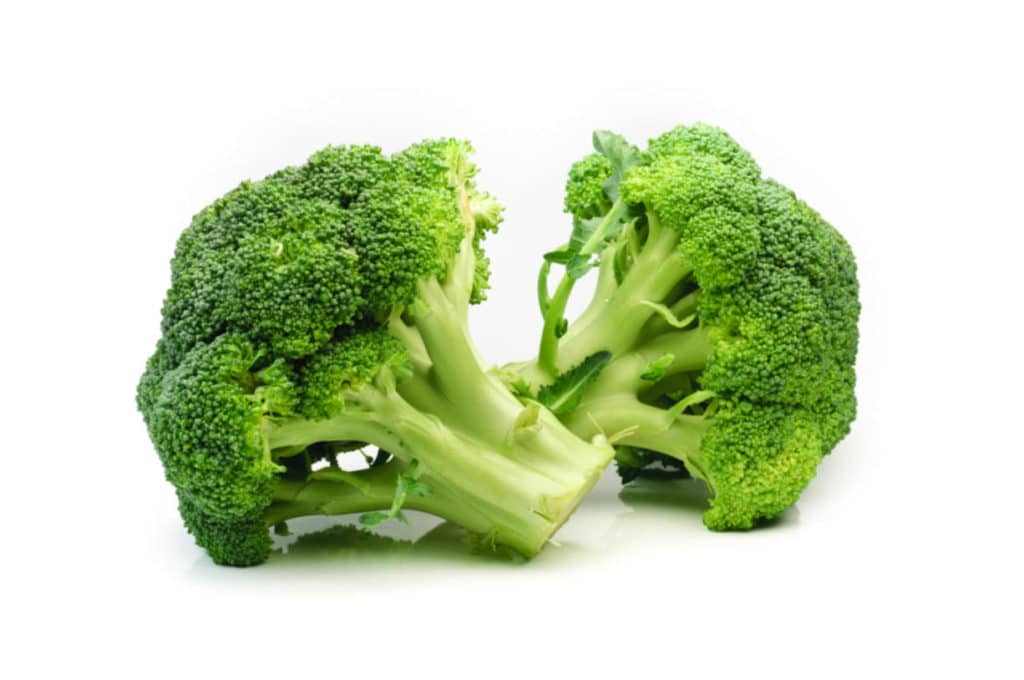
Broccoli is a type of cruciferous vegetable with many health-boosting nutrients. Considered another potent source of vitamin C, broccoli is also rich in vitamin K, minerals, flavonoids, and other antioxidant compounds such as sulforaphane.
Studies show that the sulforaphane content increases glutathione and glutathione-related enzymes which may aid in detoxification and prevention of cancer (9).
Another study showed that broccoli accounted for 15% of the daily requirement of vitamin C with positive levels of flavonoids, quercetin, and kaempferol (10).
Quercetin, as studies reveal, has potent antioxidant activity in radical scavenging and anti-allergic properties that helps enhance the immune system (11).
A study on kaempferol has revealed that this polyphenol is found in tea, broccoli, and other foods and can fight free radicals to reduce the incidence of diseases such as cancer (12).
Add broccoli to your soups, pasta, or salads to get a whole range of benefits.
Summary: Broccoli is a powerhouse of nutrients that aid in enhancing the immune system. The high vitamin C content combined with other antioxidant polyphenols help fight free radical damage and protect the body against various diseases.
4. Garlic
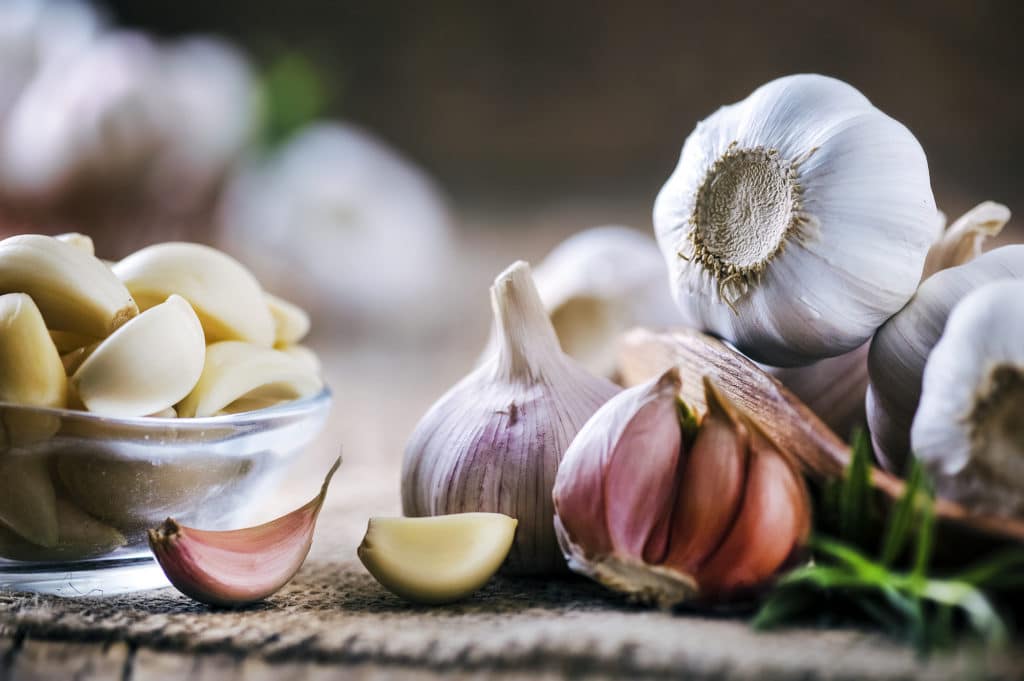
Garlic, a traditional herb has been used for thousands of years in different cuisines of the world. Known for its medicinal properties, it has become a must-have seasoning and adds unique flavor and aroma to dishes.
Garlic owes its immune-boosting properties to various bioactive ingredients such as alliinase enzyme, the sulfur-containing compound alliin, and its enzyme allicin. These compounds, as indicated by studies, have shown to exhibit anti-inflammatory properties and inhibit the proliferation of cancer cells (13).
Studies suggest that Aged Garlic Extract (AGE) has shown potential in enhancing immune cell functions and can reduce the inciAged Garlic Extract Modifies Human Immunity.dence and severity of cold and flu (14, 15).
Research says that garlic is a proven natural antibiotic and exhibits powerful antimicrobial properties against many bacteria and fungi (16).
Chew on raw garlic, add it to your food preparations for that extra flavor and health.
Summary: Garlic contains bioactive compounds and enzymes that boost the immune system naturally. The compounds in garlic including those in aged-garlic extracts possess anti-inflammatory, antiviral, and antimicrobial properties that help protect against various diseases.
5. Ginger
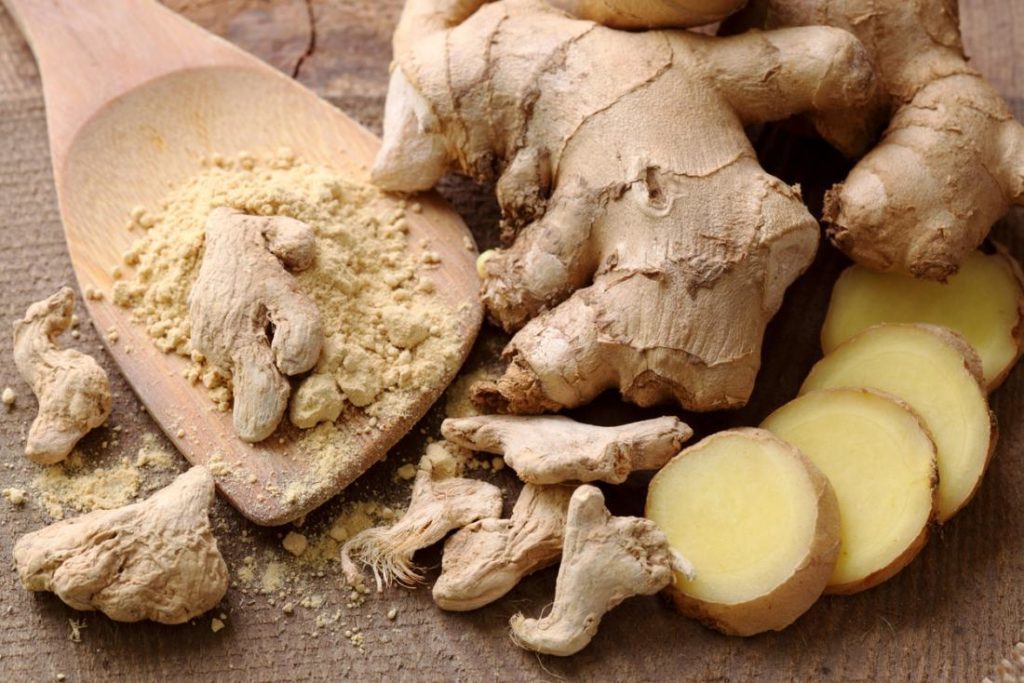
Ginger is the rhizome or root of the flowering ginger plant. Characterized by a strong pungent and tangy flavor, ginger has been used widely in traditional Indian, Chinese, and Arabian cuisine and medicine for thousands of years.
Ginger has an abundance of bioactive compounds such as phenolic compounds, terpenes, polysaccharides, lipids, organic acids, and raw fibers. Studies show that these constituents of ginger have demonstrated antioxidant, anti-inflammatory, antimicrobial, and anticancer properties that help boost immunity (17).
A study on the effects of ginger on smokers and non-smokers showed that ginger extracts increased hemoglobin concentration in smokers and induced a better antibody or immunity response in non-smokers (18).
Scientific studies show that the phenolic compounds such as gingerols, shogaols, quercetin, zingerone, etc. exhibit therapeutic properties to prevent diseases via modulation of genetic and metabolic activities (19).
A study on the anti-microbial properties of ginger indicated that ginger with its various constituents such as monoterpenoids, phenolic compounds, aldehydes, etc. could provide a broad antimicrobial spectrum against various microorganisms (20).
Use ginger to add flavor to your tea. Add it to food preparations or use as a garnish to get that extra zing in your dishes.
Summary: Ginger has many unique active compounds that display protective properties to boost immunity. These compounds exert therapeutic properties that can prevent diseases caused by free radicals and various microorganisms.
6. Spinach
Dark leafy greens often top the list of healthy foods as they are a potent source of vital nutrients that support immunity. Spinach, kale, swiss chard, broccoli, etc. all fall in this category.
Spinach is capable of boosting immunity as it is loaded with antioxidants, folate, vitamins A, C, E, fiber, iron, and other minerals (21).
Spinach has a high content of beta carotene which is a precursor of vitamin A which makes it a forerunner in enhancing immunity in the human body. Studies show that vitamin A has anti-inflammatory properties that make it highly crucial for maintaining immunity (22).
A strong source of folate or B vitamin, spinach consumption can bridge folate deficits in the human body. Research suggests that folate is essential for the maintenance of cell DNA and a deficiency in folate results in DNA instability (23).
Spinach has considerable quantities of various vitamins including C and E. Studies also suggest that vitamins C and E enhance the immunity and lower incidences of the common cold (24).
Try spinach as raw additions to salads, saute lightly into stir-fries, cook and blend for vibrant curries or add it to your creamy pasta for that extra nourishment.
Summary: Spinach, an essential dark leafy green, is loaded with vital nutrients that protect the body against immunity damage. The antioxidants and folate help in maintaining stability in the cells’ DNA and vitamins A, C, and E boost immunity to protect against diseases.
7. Probiotic Foods
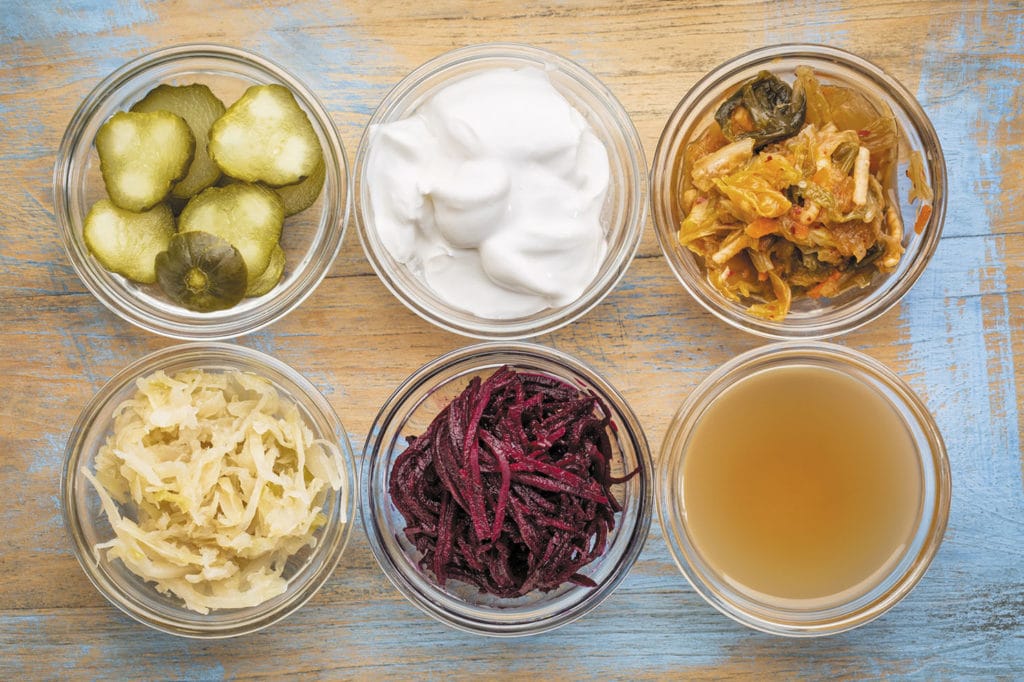
Probiotic foods are those which have live cultures of good bacteria that promote health and immunity to the human body. Yogurt and kefir are good examples of probiotic foods.
Studies show that kefir, a fermented milk product made with kefir grains or live bacteria, has many health benefits due to its protective properties (25).
Another study indicated that probiotics like yogurt can improve the gut mucosal immune system by increasing the number of antibodies produced by white blood (WBC) cells in the effector site of the intestine (26).
Probiotics fortified with vitamin D are more beneficial to health. Research shows that vitamin D deficiency can increase susceptibility to infection. So, having probiotics in combination with Vitamin D doubles the positive effect (27).
Plain yogurts are better than flavored or sweetened varieties. Add some fruits and honey to make the yogurt more interesting and healthy.
Summary: Probiotic products such as yogurt and kefir help in boosting immunity immensely. Plain probiotics with active, live cultures and added vitamin D is more beneficial for protection against diseases.
8. Almonds
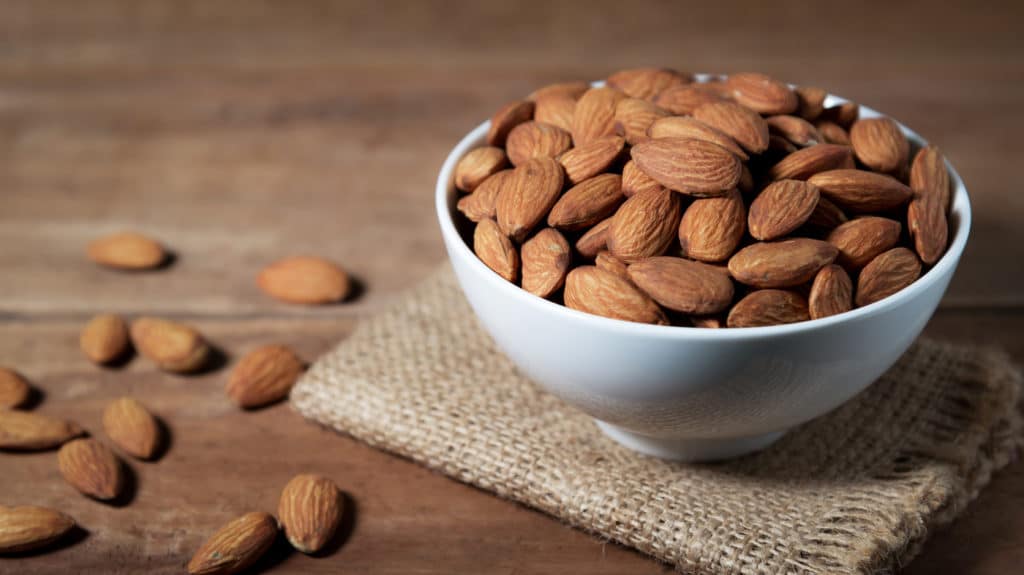
Almond, the extremely nutritious seed of the almond tree, is one of the most popular and top-ranking nuts in terms of nutrition. Almond contains proteins, fiber, mono-saturated fats, vitamins, and minerals that make it one healthy snack.
An ounce or 28 g of almonds gives you 7.3 mg of vitamin E that meets 37% of the RDI as well as 32% of manganese, 19% of magnesium, 14% of phosphorus apart from the considerable amount of proteins, fibers, and fats (28). These are high antioxidants that help the immune system to function perfectly. Vitamin E possesses effective antioxidant properties, and several studies profess the same (29).
Research shows that snacking on almonds for 8 weeks could reduce the proliferation of bacterial pathogens such as Bacteroides fragilis by 48% (30). Another study showed that intake of raw or roasted almonds has a positive effect on the intestine by promoting good bacteria and also regulating various bacterial enzymes resulting in improved metabolic activities (31). Studies also suggest that the natural skin of almonds can improve immune response and exhibit antiviral properties that can prevent infections (32).
Indulge in a daily snack of raw or roasted almonds or add them in the powdered or grated form to your dishes to boost the nutrition in your daily diet.
Summary: Almonds are potent sources of vitamin E, various essential minerals, and other nutrients. Snacking on raw or roasted almonds with the skin improves gut bacterial health and protects against viral infections.
9. Turmeric
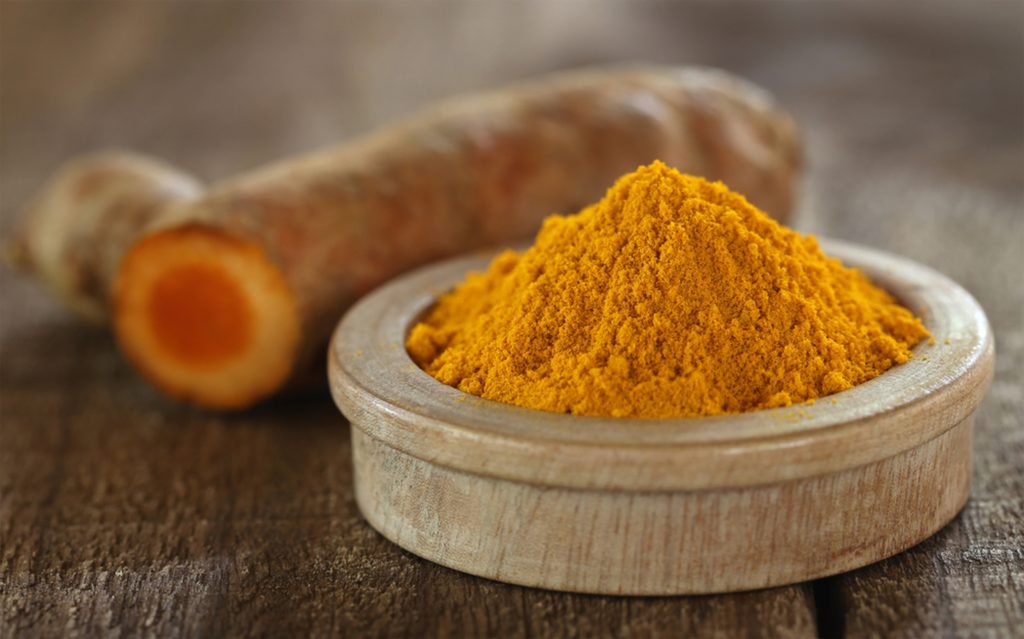
Turmeric, a common spice used in culinary recipes for ages, is also known to possess excellent medicinal properties that can boost human health.
Turmeric is referred to as ‘golden spice’ and is packed with bioactive compounds that are antioxidants. Several studies have confirmed turmeric’s ability to protect against harmful free radicals (33).
The active ingredient in turmeric is curcumin, which is also responsible for its vibrant yellow color. Research says that curcumin may have the ability to downregulate the expression of various proinflammatory cytokines, mediate and regulate immunity, and protect the body from damage (34).
A study on the safety and anti-inflammatory properties of turmeric concluded that turmeric was proven safe for use and that its anti-inflammatory activity works by inhibiting several molecules that cause inflammation (35).
The effect of curcumin on different bacteria has been intensively studied. Studies indicate that curcumin displays a broad-spectrum antibacterial role against various bacterial pathogens (36).
Summary: Turmeric and its active ingredient curcumin can fight free radicals effectively. Turmeric with its anti-inflammatory, antiviral, and antibacterial properties enhances the immunity system to protect the body from various pathogens.
10. Green Tea
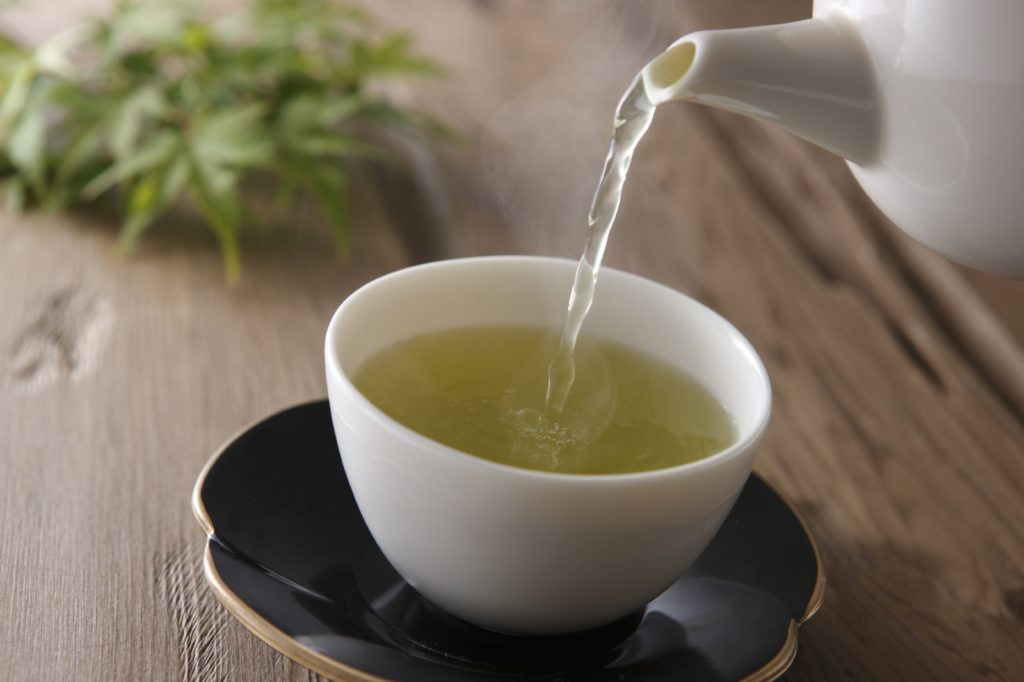
Green Tea, with origins in China, has been known to deliver various health benefits for centuries. Green tea’s secret to health lies in its unique content of phenolic compounds or catechins, particularly epigallocatechin gallate (EGCG), amino acids, and various flavonoids.
The catechins in green tea, as studies indicate, exert powerful antioxidant or pro-oxidant protective effects, that protect the body from free-radical damage and diseases such as cancer (37).
Apart from catechins, green tea is also an excellent source of L-theanine, an important amino acid that possibly helps in maintaining systemic immunity. Studies show that green tea catechins and theanine work to reduce viruses that cause influenza infection (38). Studies show that derivatives of flavonols and flavones in green tea such as myricetin, quercetin, apigenin, and kaempferol also exhibit radical-scavenging activity and reduction in intracellular oxidative stress (39). Apart from brewed tea, green tea infusions can be used in pasta, rice-based dishes, and baking cookies.
Summary: Green tea has many bio-active compounds that exert protective properties in boosting immune health. The catechins, L-theanine amino acid, and flavonoids in green tea have antioxidant and radical-scavenging activities that protect the body from influenza and even cancer.
11. Papaya
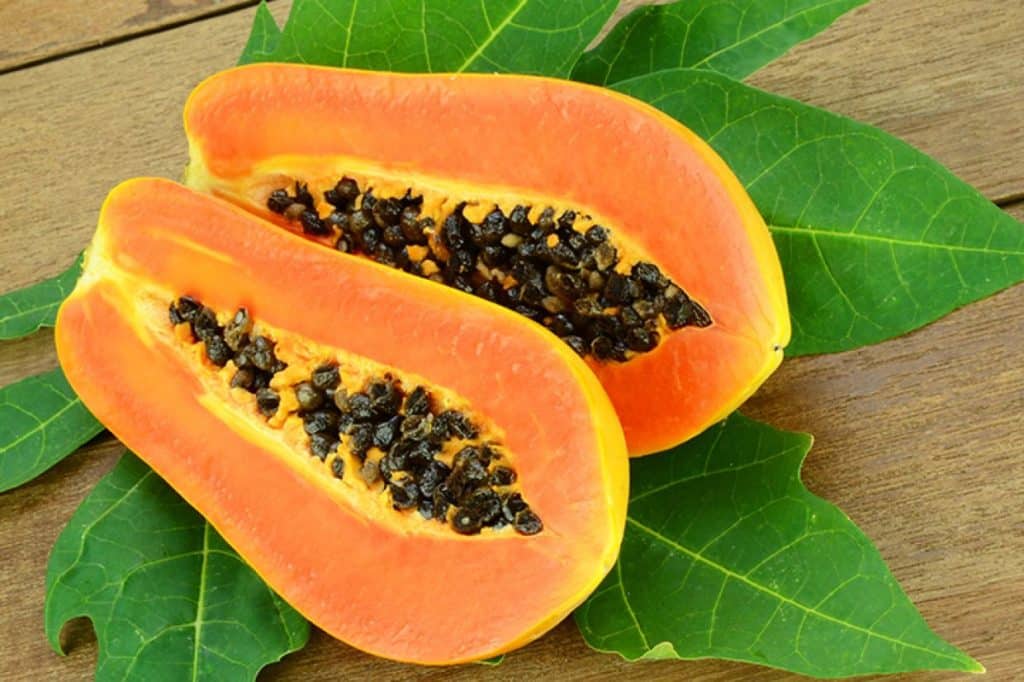
Papaya, a tropical fruit, has many health benefits owing to its high content of antioxidants and nutrients. Just one cup or 140 g of raw papaya can give a whopping 86.5 mg of vitamin C which constitutes 144% of the Recommended Dietary Intake (RDI) value (40).
Studies indicate that vitamin C may be useful in preventing or treating various infections such as common cold, pneumonia, etc (41). The enzyme papain found in papaya has been known to possess profound anti-inflammatory properties that are beneficial for treating many medical conditions (42).
Ripened papaya fruit can be consumed raw and the unripened fruit can be used in food preparations. It can be cooked and eaten or used in a salad.
Summary: Papaya is rich in various phytochemicals, vitamins, and minerals. Papain shows high anti-inflammatory activity and the high vitamin C content is useful for the prevention and treatment of various respiratory conditions.
12. Kiwi
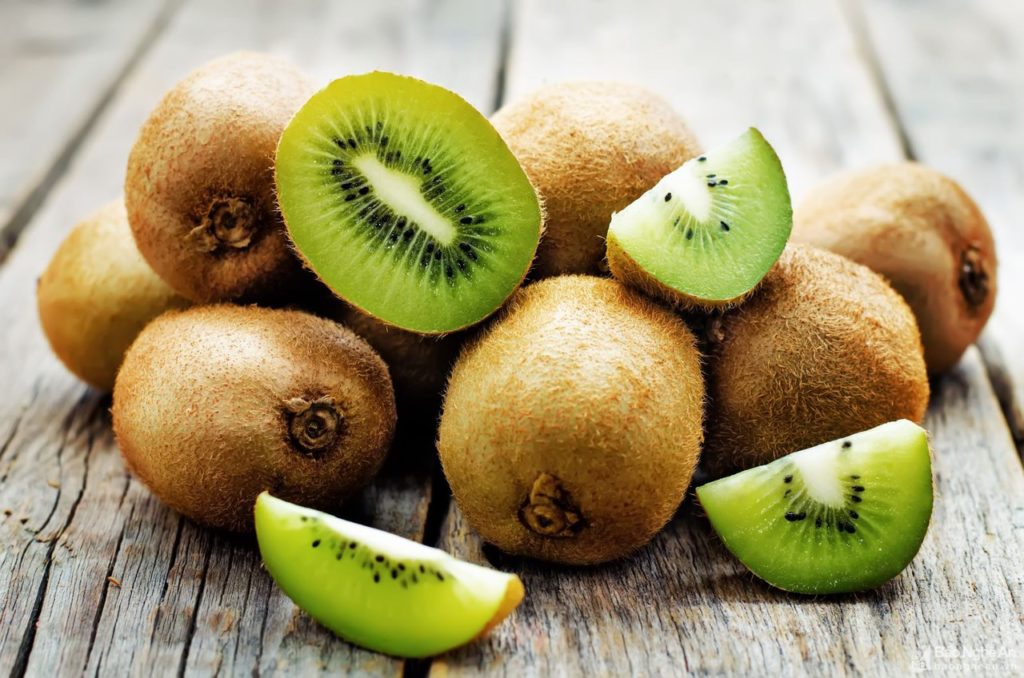
Kiwi or the Chinese gooseberry is a nutrient-dense fruit with a sweet-tangy flavor. One of the best contenders of vitamin C, a single kiwi can provide 84.4 mg or 141 % which meets more than your daily requirement. It also contains other nutrients such as vitamin K, vitamin E, folate, trace minerals, and multiple amino acids (43).
Scientific studies indicate that vitamin C obtained through the consumption of fruits and vegetables is more protective and is found to exert a positive impact in reducing oxidative DNA damage to cells (44). Another study showed that vitamin K has anti-inflammatory properties and can suppress the production of inflammatory cytokines (45).
Research indicates that regular intake of kiwi boosts immunity, enhances antioxidant defense while improving gastrointestinal functions, protein digestion, and preventing respiratory infections (46). So just go ahead, scoop a kiwi fruit and enjoy!
Summary: Kiwi contains high amounts of vitamins C and K as well as other nutrients. Consumption of a kiwi fruit every day enhances body immunity to keep your health in top condition.
13. Poultry
Say ‘Poultry” and immediately ‘chicken’ is what pops into your mind, though poultry also refers to the farming of ducks, geese, quails, etc for their meat and eggs. Chicken is by far the most popular and nutritious of the poultry variety.
Chicken is a great source of protein with its high content of essential amino acids. It also provides ample amounts of niacin and B6 vitamins. Studies show that B6 is a highly essential nutrient and its deficiency affects immune responses (47).
Research suggests that chicken soup may decrease the inflammatory response associated with viral illnesses (48). Recent studies also emphasize the importance of amino acids in boosting the immune system in animals and humans (49).
Summary: Chicken has vital nutrients such as amino acids and vitamin B6 that boost immunity in the human body. Chicken broth is also considered efficient in lowering inflammatory responses and offers protection against viral illnesses.
14. Seafood
Seafood such as varieties of fish and shellfish are generally considered healthy food as they offer ample amounts of protein, omega-3 fatty acids, and essential minerals such as zinc.
Research indicates that Inuit populations in Greenland whose primary diet was fish had lower incidences of cardiovascular diseases and the autoimmune disorder, rheumatoid arthritis, conditions where inflammation was significant. Fish oil contains omega-3, eicosapentaenoic acid (EPA), and docosahexaenoic acid (DHA), that are extremely good in strengthening your immune system (50).
Shellfish such as oysters are rich sources of zinc and just 2 cooked oysters a day meets your daily requirement of zinc. Zinc stability is extremely crucial for the maintenance of a strong immune system as studies suggest that the adequate function of virtually all immune cells is highly zinc-dependent (51).
Summary: Including oily fish and shellfish is essential to boost immunity. The omega-3 fatty acids and zinc are vital to lower the incidence of inflammatory diseases and maintain cell immunity for good health.
15. Sunflower Seeds
With a mild, nutty flavour and a beautiful texture, these little seeds of the sunflower, pack a lot of nutrition that benefits human health. Sunflower seeds contain vital nutrients such as vitamins B6 and E, plus minerals such as phosphorus, magnesium all of which play an important role in boosting immunity (52).
Various studies emphasize the importance of vitamin E as an essential nutrient that enhances the functioning of the immune system to reduce the incidence of infections by modulating T cell function (53).
The minerals magnesium and phosphorus present in sunflower seeds are crucial in maintaining immunity. Magnesium is vital for cell functioning, nucleic acid synthesis, and cell repair, as well as maintaining the antioxidant status of the cell (54). Phosphorus is considered essential as it supports immune functions and maintains a stable microbial ecosystem in the gastrointestinal tract (55). Eat a handful of sunflower seeds as snacks or add it to your breakfast cereals for that extra crunch.
Summary: Sunflower seeds contain vital vitamins and minerals that aid immunity. These nutrients help reduce the rate of infections and maintain cell immunity for overall health.
16. Mushrooms
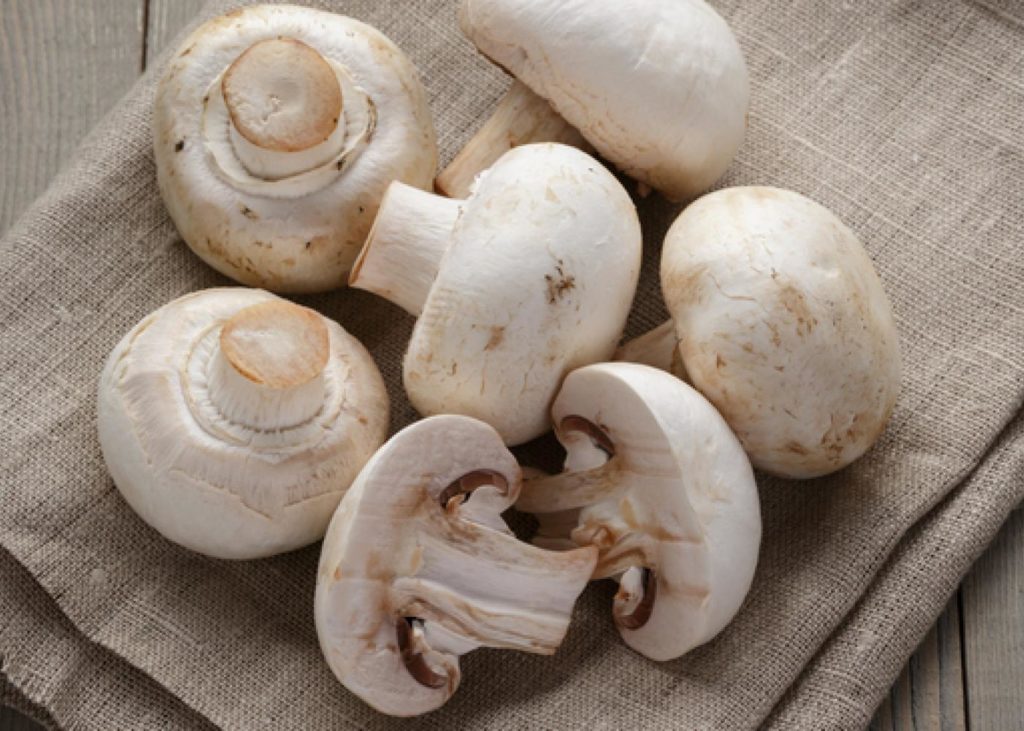
Mushrooms are types of edible fungus, much sought-after for their medicinal qualities. Mushrooms are loaded with antioxidants, proteins, vitamins, and essential minerals that aids in boosting immunity to the body.
Studies show that various mushrooms are good (10% – 19% DV) source of niacin, pantothenic acid, selenium, and copper and an excellent source (≥20% DV) of riboflavin all of which are immune boosters (56).
Mushrooms whether exposed to UV light or some sunlight are high in vitamin D content (57). Studies consistently support the fact that vitamin D is essential for immunity and that deficiency of vitamin D could pave the way for several autoimmune disorders (58).
One study showed that the polysaccharides in mushrooms, belonging to a group of beta-glucans, increase immunity by enhancing macrophages and natural killer cell function (59).
Sauteed, grilled, cooked and roasted, mushrooms can be added to soups, salads, omelets, and other food preparations to boost health.
Summary: Mushrooms contain vitamin D which helps prevent various autoimmune disorders. The polysaccharides, B vitamins, and minerals, all help in maintaining immune cell functions which makes you less prone to diseases.
17. Watermelon
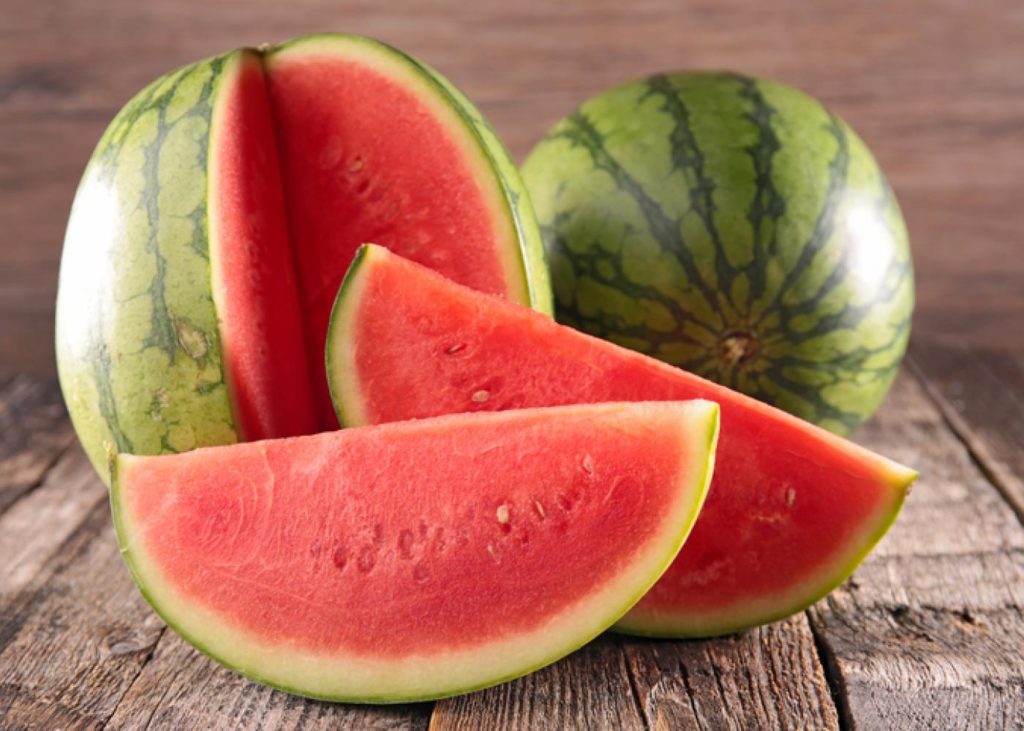
Watermelon is juicy and tasty. It is one of the most nutritious foods that can boost immunity. It is one of the top sources of lycopene and citrulline. Apart from lycopene, it also contains potassium, vitamin A, B6, and C.
Research states that lycopene has oxygen scavenging abilities and protects the body from various diseases caused by different pathogens (60).
Watermelon contains citrulline, an amino acid that can be metabolized to arginine, a conditionally essential amino acid. Studies show that arginine is the nitrogenous substrate used in the synthesis of nitric oxide which is essential for the balance of immune functions (61).
Studies indicate that consumption of watermelon rich in lycopene, β-carotene, and vitamin C provides anti-inflammatory, anticancer, and antioxidant properties that inhibit the formation of free radicals and prevent various diseases (62).
Eat watermelon as part of your fruit salads, juice, or freeze into pops to enjoy the fresh taste and health it offers.
Summary: Watermelon, with its high content of lycopene and citrulline, is capable of boosting health through its oxygen scavenging activity. The carotenoids and vitamins act as powerful inhibitors of pathogens to protect the human body from diseases.
18. Sweet Potatoes

Sweet potatoes are mildly sweet, starchy root vegetables packed with health-benefiting nutrients. Rich in beta-carotene, fair amounts of vitamin C, dietary fiber, and minerals such as potassium, and magnesium, they serve as great immune-boosting food.
Beta-carotene is a precursor of vitamin A. Studies show that consumption of sweet potato enhances vitamin A availability through its rich beta-carotene content (63).
Research indicates that beta-carotene shows antioxidant and pro-oxidant properties and enhances the availability of vitamin A to protect against diseases and lower mortality (64).
The flesh and skin of sweet potatoes can range in different colors such as white, yellow, red/orange, or purple owing to the presence of the pigment, anthocyanins. Anthocyanins also show potential in scavenging free-radicals and exerting antioxidant properties (65).
Relish sweet potatoes as chips or baked pies for that extra ounce of health.
Summary: Sweet potatoes are equipped with high beta carotene content, vitamin C, and anthocyanins that exhibit free-radical scavenging activities. The potent antioxidant properties of these nutrients reduce immunity to damage and the occurrence of disease.
19. Wheat Germ
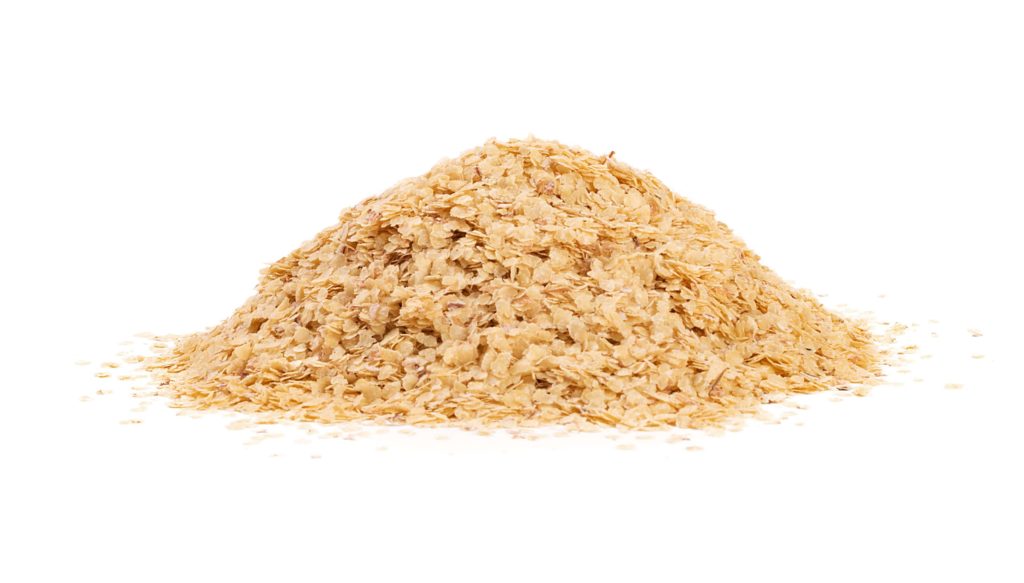
Wheat germ is the embryo of the wheat plant. It is loaded with essential nutrients and just an ounce (28g) of wheat germ can provide you with dietary fiber, protein, fats, and essential micronutrients. They are thiamin, folate, vitamin B6, and minerals such as manganese, selenium, phosphorus, and zinc (66).
Wheat germ, especially in the toasted form is a good source of vitamin E. Studies show that wheat germ supplementation could improve the levels of vitamin E and increase the antioxidant defense level (67).
Studies show that wheat germ oil, owing to free-radical scavenging abilities, is powerful enough to minimize toxicity in the stomach and liver caused by drugs such as aspirin (68).
Another study showed that wheat germ oil which is a rich source of alpha-linolenic acid (n-3 fatty acids) has the potential to exert an antiatherosclerotic effect by reducing oxidative stress in patients with conditions such as hypercholesterolemia (69).
Add wheat germ to breakfast cereals, use as toppings for yogurt or shakes and replace some flour with wheat germ while baking.
Summary: Wheat germ has high amounts of essential nutrients that exhibit potent antioxidant properties. Wheat germ oil has the potential to minimize toxicity induced by drugs and prevent or minimize oxidative stress essential for certain medical conditions.
20. Berries

Berries are small juicy fruits, usually without pits, that are bright or dark-colored and full of nutrition. Berries are good sources of fiber, vitamins, flavonoids, and other polyphenols which may boost immunity in the human body. Strawberries, raspberries, blueberries, acai, and elderberries are good examples.
Studies suggest that consumption of foods such as berries that are high in flavonoids and anthocyanins may exert an anti-inflammatory effect that could prevent the incidence of certain chronic diseases (70).
One study showed that the polysaccharide content in acai berries had a profound effect on the immune system (71).
Another study showed that blueberries have displayed anti-carcinogenic properties that help prevent inflammation, oxidative DNA damage, and inhibition of cancer cell proliferation to reduce the risk of diseases such as cancer (72).
One study on elderberries showed that supplementation with these berries could be beneficial in treating upper respiratory tract infections (73). Snack on raw berries, add them to your breakfast cereals, make smoothies, or bake them as tarts.
Summary: Berries pack a punch of nutrition which helps boost immunity. The flavanols, anthocyanins, polysaccharides, and other nutrients exert protective effects that reduce the exposure or help in the treatment of infections.
6 Other Factors That Support Immunity
Changing your diet to a healthier one to include essential food is the primary need of the hour. But doing only that does not provide the complete immunity your body needs. Other lifestyle changes matter too. Certain factors to consider are:
- Regular physical exercise
- Adequate and sound sleep
- Good weight management
- Lower your stress levels and relax more
- Maintain good hygiene
- Reduce or stop smoking and alcohol-drinking
The Final Note
The human body has a complex immune system. A good, healthy diet is one of the best ways to support health and enhance immunity.
Certain kinds of foods can provide a good boost to the immune system. Including health-boosting foods such as fruits, vegetables, seafood, poultry, nuts, and edible fungi provides the body with the necessary nutrients to promote a stronger immune system.
Apart from a healthy diet, other lifestyle factors such as sleep, stress, exercise, hygiene all contribute to enhancing and maintaining good immunity and health.

